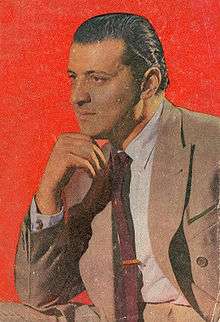Julio Sosa
Julio María Sosa Venturini (February 2, 1926 – November 26, 1964), usually referred to simply as Julio Sosa or El Varón del Tango, was a Uruguayan tango singer.
Julio Sosa | |
|---|---|
 Julio Sosa | |
| Background information | |
| Birth name | Julio María Sosa Venturini |
| Born | 2 February 1926 Las Piedras, Uruguay |
| Died | 26 November 1964 (aged 38) Buenos Aires, Argentina |
| Genres | Traditional pop, Tango, Milonga, Folk |
| Occupation(s) | Singer, songwriter, actor |
| Instruments | Vocals |
| Years active | 1940s–1964 |
| Labels | Sony BMG, RCA, Magenta |
Biography
Sosa was born in Las Piedras, a Canelones Department suburb of Montevideo, Uruguay. He moved to Buenos Aires, Argentina, in 1949, where he became famous with the Orquesta Francini-Pontier the Orquesta típica formed by the violinist Enrique Mario Francini and the bandoneonist Armando Pontier . Working with numerous other orchestras, he was reunited with Pontier in 1955, with whom he recorded several best-selling albums on the RCA Victor and Columbia labels and became one of the most important tango singers in the genre's history.[1]
He married Nora Ulfed in 1958 and had a daughter. His marriage ended in separation, however, and he settled into a relationship with Susana Merighi. His towering masculinity and reserved strength earned him the nickname El Varón del Tango ("The Man's Man of Tango"). Sosa also published a book of poetry, Dos horas antes del alba ("Two Hours Before the Dawn"), in 1960. Following his switch to Columbia Records in 1961, the Pontier orchestra incorporated a new bandoneonist, Leopoldo Federico, and the association helped make the group the most successful in its genre, at the time.[1]
Sosa's fame acquainted him with sports cars as well. He had numerous accidents during the early 1960s, mostly as a result of speeding. He was behind the wheel of a DKW coupé when, in the early hours of November 26, 1964, he crashed at high speed into a traffic light on Buenos Aires' Figueroa Alcorta Avenue, killing himself at age 38.[1]